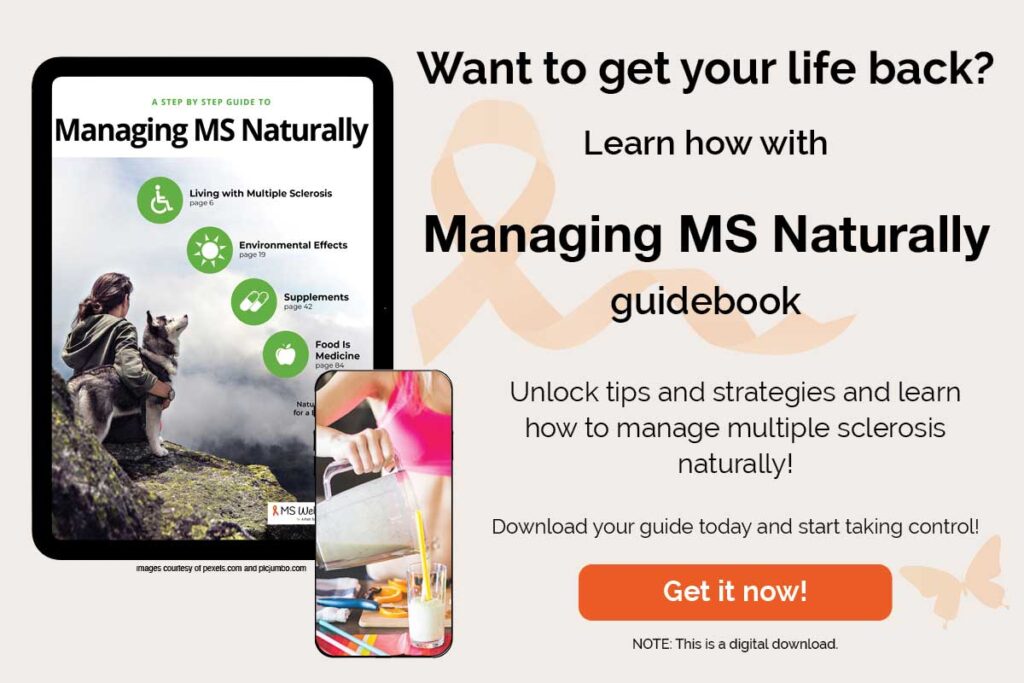
Let’s face it, living with multiple sclerosis (MS) can make you feel like you’re stuck in a rut. A rut of treatments, side effects, and disappointment. You’ve tried everything the doctors have thrown at you. But still, that nagging fear of progression haunts your every move.
You’re frustrated, exhausted, and even a little scared. You might be thinking, “What’s the point of all these meds if I still feel like crap?” or “Is this really all there is?” Trust me, you’re not alone in feeling this way, I’ve been there. It’s totally normal to want more than just managing symptoms – you want your life back.
What if finding balance through managing your “whole body” is the missing piece of your MS puzzle? It’s called holistic health. And no, it’s not some “hippie trend.” It’s a fresh perspective that could change the game for you.
Get ready to explore a path that treats you as a whole person, not just a collection of symptoms. Let’s dive in and discover how holistic health might be the ally you’ve been searching for.
What is Holistic Health?

Holistic health isn’t just about treating symptoms. It’s about looking at you as a whole – body, mind, and spirit. This approach considers your physical health, emotional state, mental well-being, and spiritual needs. Instead of just treating symptoms, holistic health seeks harmony in your entire life.
There are many different types of holistic doctors who can help you on your journey to managing MS naturally. Each one focuses on treating the whole person, not just the symptoms. They use various natural and alternative methods to promote overall health and well-being.
- Naturopathic Doctors (NDs): They use natural therapies, such as herbs, nutrition, and lifestyle changes.
- Functional Medicine Practitioners (FMP): They look at the root causes of health issues and use personalized treatments. – This is the route I went.
- Chiropractors: They focus on the spine and nervous system, using adjustments to improve health. – My FMP is a chiropractor.
- Acupuncturists: They use tiny needles to stimulate specific points on the body to promote healing.
- Homeopathic Doctors: They use small doses of natural substances to stimulate the body’s healing process.
- Ayurvedic Practitioners: They follow ancient Indian practices using diet, herbs, and body treatments.
- Integrative Medicine Doctors: They combine conventional medicine with natural therapies.
- Holistic Nutritionists: They use food and nutrition to support overall health.
- Mind-Body Therapists: They use meditation, yoga, and stress management techniques to improve health.
- Herbalists: They use plants and herbs to treat various health conditions.
Why Does Holistic Health Work?

Think of your body as a complex system where everything is connected. When one part is out of balance, it affects the rest. For example, you might notice more pain or fatigue if you’re stressed. Holistic health addresses these connections by focusing on the root causes of your problems, not just the symptoms.
Holistic health works because it looks at the big picture. Instead of just taking a pill for pain, it explores why you’re in pain in the first place. Maybe it’s due to inflammation, poor diet, or stress. You can improve your overall well-being by tackling these root issues with natural practices, like eating nutritious foods, doing gentle exercises, and practicing relaxation techniques.
Using natural practices helps your body heal and function better. Eating the right foods gives you energy and reduces inflammation. Exercise strengthens your muscles and improves your mood. Relaxation techniques, like meditation, help you manage stress, which can reduce your symptoms. When all these parts of your life are balanced, you feel better and your MS symptoms can become easier to manage.
When Symptoms Take Over

Image by pvproductions on Freepik
Living with MS is tough!—And, that isn’t even close to the overwhelmingness a person with MS feels every day. You might experience fatigue that feels like overwhelming exhaustion. Pain that feels like relentless agony. Cognitive issues that leave you with frustrating confusion. Or, bladder issues that leave you embarrassed and frustrated. And let’s not forget the emotional toll – stress, anxiety, and mood swings can be a real struggle.
Without a holistic approach, these symptoms can worsen over time. Stress, poor diet, lack of exercise, and negative emotions can all lead to progression. They say up to 50% of people with MS experience depression at some point.—Really, only 50%? I would think everyone with MS experiences depression “at some point.” That’s why it’s important to address all aspects of your body including your emotions.
Taking Control of Your Symptoms

Now, imagine a different scenario. Holistic health helps many people with MS manage their symptoms better. They report having more energy, less pain, improved mood, and a greater sense of well-being.
I’ve been living with MS for decades. In 2004, I finally hit rock bottom when an MS flare left me looking like I had a stroke. I had double vision, slurred speech, I couldn’t walk, and half my face was paralyzed. That’s when I started looking for something better and found I could use “food as medicine.”
I started managing my MS naturally without drugs in 2005. But, I’ll be honest, I wasn’t taking care of my body as a whole. There were several years when I went through severe stress and my MS symptoms got worse. Today, I do more than eat a healthy diet, I take care of every aspect of my body. I meditate and don’t let stress get to me as much. I’ve trained my mindset to be happier despite living with MS. It’s not perfect, but I feel calmer and more at peace.
How to Bring Holistic Health into Your Life

Ready to give it a try? Whether you’re on disease-modifying therapies (DMTs) or exploring an all-natural approach, holistic health can be a game-changer. Here are some ways to weave these practices into your daily life:
1. Diet and Nutrition
What you eat can have a big impact on how you feel. A balanced, nutrient-rich diet can help manage inflammation and boost your energy levels.
- Foods to include: Colorful fruits and vegetables, herbs, lean proteins, and healthy fats.
- Foods to avoid: Processed foods, excessive sugar, dairy (very important!), and gluten. Studies found dairy increases flares in people with MS, this includes whey.
Tip: Start by making small changes. Instead of soda, drink water or herbal tea. Maybe swap your afternoon snack for a piece of fruit and a small handful of nuts. Or try adding an extra serving of vegetables to your dinner.
2. Physical Activity
Moving your body, even in small ways, can make a big difference. Regular exercise can help with balance, strength, and mood.
- Try gentle exercises like yoga, swimming, or walking.
- Listen to your body and don’t push too hard.
Tip: Start with just 5 minutes a day and gradually increase as you feel able.
3. Mental and Emotional Well-being
Taking care of your mind is just as important as taking care of your body. Stress and negative emotions can worsen MS symptoms.
- Practice mindfulness or meditation to reduce stress.
- Try deep breathing exercises when you’re feeling overwhelmed.
- Keep a gratitude journal to help maintain a positive outlook.
Tip: Set aside a few minutes each day for a mental health break. It could be as simple as sitting quietly and focusing on your breath.
4. Spiritual Health
Connecting with something bigger than yourself can provide comfort and purpose.
- Spend time in nature—my favorite thing to do!
- Practice journaling to explore your thoughts and feelings.
- Engage in spiritual rituals that resonate with you. It doesn’t have to be religious but if that’s your thing go for it!
Tip: Take a moment each day to appreciate the beauty around you, whether it’s a sunset or a kind gesture from a friend.
5. Creating a Balanced Routine
Combining these elements into a daily routine can help you maintain balance. It can also make managing your MS symptoms more effective.
- Start small. Don’t try to change everything at once.
- Be patient with yourself. It takes time to build new habits.
- Listen to your body and adjust your routine as needed.
Tip: Choose one small change to start with, like drinking an extra glass of water each day or taking a 5-minute walk. Once that becomes a habit, add another small change.
Finding Your Own Balance

Image by prostooleh on Freepik
Living with MS isn’t easy, but you’re not alone in this journey. Adopting a holistic approach can help you manage your symptoms. It also improves your quality of life. Every person with MS is different, and what works for one might not work for another. The key is to be patient, listen to your body, and find the balance that works best for you.
Are you ready to take the first step? Why not start today? Choose one small change from the suggestions above and give it a try. You might be surprised at how small changes can lead to big improvements over time.
Remember, your journey with MS is just that – a journey. There will be ups and downs, good days and bad days. But by taking a holistic approach to your health, you’re giving yourself the best chance to live well with MS.
Here’s to finding your balance and taking control of your health, one step at a time. You’ve got this!


Holistic Health Truths Doctors Rarely Share






